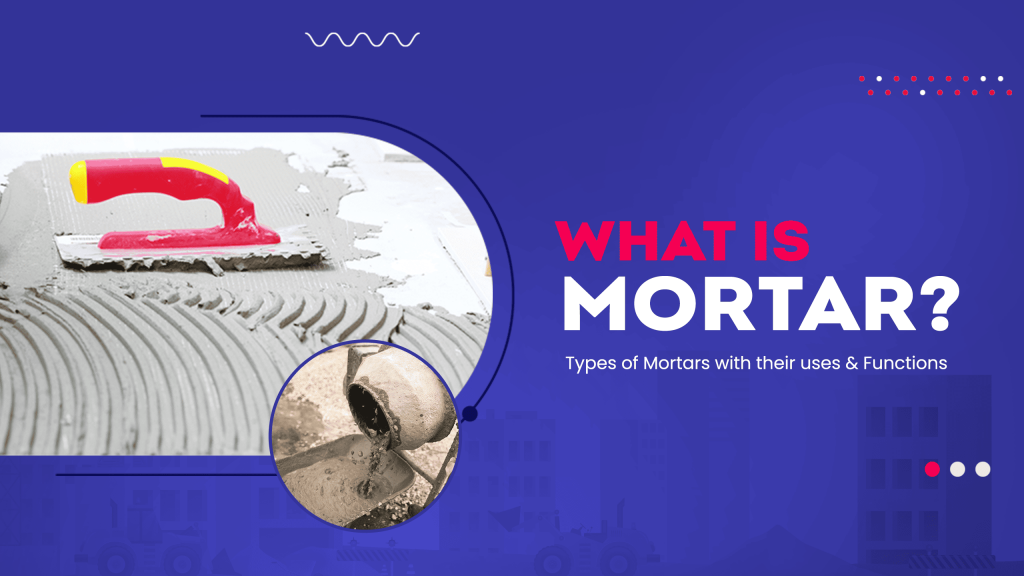
When it comes to construction projects, picking the right mortar is vital for durability and strength. Understanding the characteristics and uses of each type is essential for successful outcomes. In this blog post, we explore the different types of mortar, giving you valuable insights to make informed decisions. Whether you’re experienced or new to the field, this knowledge is a valuable addition to your construction toolbox. Let’s dive in and discover the key mortar types that will enhance your building projects.
What is Mortar?
Mortar is a binding agent that helps to bind the building units to form large structures in construction. It consists of a binder and fine aggregates that are mixed with water to seal the building blocks like stones and bricks. It imparts strength and resilience to the building structures after setting. The binder is a substance that bonds with the building blocks mechanically and chemically to hold them together. Cement or lime acts as a binder in the mortar. Sand, sawdust, surki etc are different types of fine aggregates mixed with a binder to further increase the strength.
Uses Of Mortar
- It is used as a binder in masonry structures and seals the bricks and stones to fill the gap.
- It is used in plastering the interior walls to give a smooth finish.
- It is used for pointing and restoration.
- It is used to make decorative and ornamental structures on the walls.
- It is made up of inert materials that provide resistance from heat, fire and moisture.
- It is used to cover the irregularities or undulations in the building structures. It also masks poor workmanship.
Mostly Used Types of Mortar
Based on their composition, mortar is of the following types
1- Cement Mortar
Cement mortar is the most common type of mortar used in construction. It is used in masonry, concrete build-ups, plastering etc. The cement acts as a binder while sand is used as fine aggregates. Cement mortar has high strength and resilience. The cement and sand ratio differs from 1:2 to 1:6 depending on the surface where mortar is used. Its setting time is 1 hour, therefore, it gives a good workable time.
2- Lime Mortar
Lime mortar is another type where lime acts as a binder and sand as fine aggregate. The lime used is fat lime or hydraulic lime. The ratio of lime and sand is 1:2 or 1:3. It has lower strength than cement mortar. It is used for pointing and restoration.
3- Gypsum Mortar
Gypsum is a soft, lightweight substance composed of hydrated calcium sulfate. It is a white or greyish low-strength material. It is used for making decorative structures and artwork on the interiors or exterior walls.
4- Mud Mortar
Mud mortar is composed of fine earth that acts as a binder mixed with sawdust, hay or cow dung that is used as fine aggregates. It is the cheapest and easily available mortar. It provides excellent thermal insulation. It is usually used in small towns and villages.
5- Surkhi Mortar
Surkhi is finely powdered burnt clay that attains a red colour. In surkhi mortar, lime is used as a binding material and surkhi as aggregate. Sand is not used in surkhi mortar.
6- Gauged Mortar
When cement and lime are mixed to be used as binders in the mortar, it is called gauged mortar. The cement added to lime mortar provides high strength to it. The cement and lime are mixed in a ratio of 1: 6 or 1:7. Sand is used as fine aggregate. It has higher strength than lime mortar and economical than cement mortar.
Conclusion
In conclusion, it is crucial for individuals involved in the building industry to have a clear understanding of the significance of mortar in construction. Mortar serves as a vital binding agent that effectively holds masonry units together, imparting strength, durability, and cohesion to various structures. Throughout this article, we have explored various types of mortars, including cement mortar, lime mortar, and clay mortar, each possessing distinct properties and serving specific purposes. From providing structural support to enhancing aesthetic appeal, mortars play a pivotal role in construction projects. Whether it is for brickwork, stone masonry, or plastering, the careful selection of the appropriate mortar ensures the desired strength, weather resistance, and longevity of the structure.

People also search for: surkhi mortar, cement gauged mortar, what is surkhi, different types of mortars







